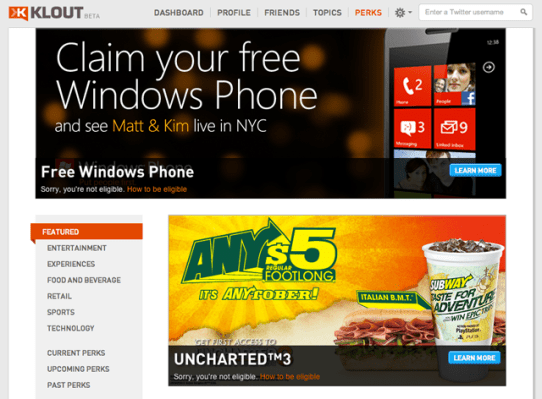Remember that time that astrologers decided that they had gotten all the zodiac signs off by one, and everyone was so bewildered because all of a sudden you were NO LONGER AN ARIES BUT A PISCES and it seemed like everything you had believed for so long was untrue.
Well the social media equivalent happened today for startup Klout and its “scores,” which purportedly give you and others an idea of your social media influence on various topics.
Apparently a Klout algorithm change made some users’ scores drop, which had people go all “the sky is falling” in the comments section of the blog post announcing the adjustment, “My score went from 73 down to 53. 20 point drop. I’ve been working for months to increase my Klout score. Please fix this,” said Klout user Timothy Whalin.
The backlash was so bad that an #OccupyKlout movement got off the ground.
But let’s back up; Why have users like Whalin been working for months to increase their scores? What have they been doing exactly?
Amy Schmittauer, host of Shmittatistic! Social Media Tips yes really, attempts to offer some insight into the wacky world of +K. Her number one tip to increase your Klout is “Don’t stay completely focused on just the score.” Okay. Tip number two is to create great content. Am. so. there.
Don’t get me wrong, I’m a big fan of products that are dumb but smart and Klout CEO Joe Fernandez might just prove to be the P.T. Barnum of our time, roping in a social media sucker every minute to the tune of 100 million. People obviously care about reputation, and Klout’s (sadly) the most prevalent way to specifically measure personal online reputation currently. You have to respect Klout for being a first mover in an industry sector that will inevitably create much value.
It’s a formidable vote of confidence that tier one VCs like Kleiner have invested over $10 million in the company — namely because Klout has the potential to dominate the hooking up of all these collaborative consumption startups (like TaskRabbit, Airbnb etc) with a reputation system that is independent from Facebook. Win.
But it’s got some hard-to-ignore issues.
“Make sure you’re engaging with people who have a relatively good to a higher Klout score,” says Klout expert Schmittauer in her video below, “When you engage with people who have like no Klout or a really low score it’s reflects poorly on you. Even spam bots have a score of 25 or something, it’s crazy.”
Klout’s pervasive problem is that the deeper among us are never going to judge anyone based solely on some arbitrary decimal score. Especially when that decimal number ranks teenbot Justin Beiber at 100, but precludes me from claiming a Windows Phone 7 “Klout Perk” and tickets to a Matt and Kim concert because I don’t have enough technology Klout.
We all have an inherent sense of who is influential and when that doesn’t stack up against some dumb number we lose faith. Case in point; I think all of you understand that there’s something wrong with a service that assigns me the same “influence” score as Mike Arrington. I’m willing to bet Steve Jobs didn’t check his Klout score.
Like most people who gave Klout a try for the first time today, I really have no idea how it works. But that’s okay, because I’m pretty sure my Klout score doesn’t matter at all, to anyone.
